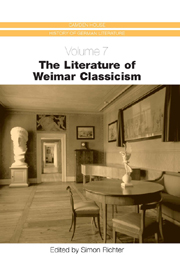Book contents
- Frontmatter
- Contents
- List of Illustrations
- Preface and Acknowledgments
- Conventions, Editions, and Abbreviations
- Introduction
- What is Classicism?
- Antiquity and Weimar Classicism
- The Correspondents' Noncorrespondence: Goethe, Schiller and the Briefwechsel
- Johann Gottfried Herder: The Weimar Classic Back of the (City)Church
- Drama and Theatrical Practice in Weimar Classicism
- German Classical Poetry
- The Novel in Weimar Classicism: Symbolic Form and Symbolic Pregnance
- German Women Writers and Classicism
- Weimar Classicism as Visual Culture
- The Irrelevance of Aesthetics and the De-Theorizing of the Self in “Classical” Weimar
- Goethe's “Classical” Science
- The Political Context of Weimar Classicism
- Bibliography
- Notes on the Contributors
- Index
Preface and Acknowledgments
Published online by Cambridge University Press: 05 February 2013
- Frontmatter
- Contents
- List of Illustrations
- Preface and Acknowledgments
- Conventions, Editions, and Abbreviations
- Introduction
- What is Classicism?
- Antiquity and Weimar Classicism
- The Correspondents' Noncorrespondence: Goethe, Schiller and the Briefwechsel
- Johann Gottfried Herder: The Weimar Classic Back of the (City)Church
- Drama and Theatrical Practice in Weimar Classicism
- German Classical Poetry
- The Novel in Weimar Classicism: Symbolic Form and Symbolic Pregnance
- German Women Writers and Classicism
- Weimar Classicism as Visual Culture
- The Irrelevance of Aesthetics and the De-Theorizing of the Self in “Classical” Weimar
- Goethe's “Classical” Science
- The Political Context of Weimar Classicism
- Bibliography
- Notes on the Contributors
- Index
Summary
Weimar Classicism (roughly the period from Johann Wolfgang von Goethe's return to Germany from Italy in 1788 to the death of his friend and collaborator Friedrich Schiller in 1805) is widely regarded as an apogee of literary art, the brief historical moment when a handful of German writers seemed to rival Homer, Virgil, and Dante, and a small duchy in Germany vied with the glory of Athens, Rome, and Florence. Although many scholars dispute the legitimacy of regarding Weimar Classicism as a distinct period, arguing that it is a species of European Romanticism, there is no disputing the significance of many works produced during this time. The present volume offers readers a major reference work characterized by new approaches to the key figures, literary works, and cultural contexts of Weimar. Contributions from leading German, British, and North American scholars open up multiple interdisciplinary perspectives on the period. Major essays on drama, poetry, and the novel are joined by accounts of the role of antiquity, politics, philosophy, aesthetics, visual culture, women writers, and science. Readers are introduced to the full panoply of cultural life in Weimar, its groundbreaking accomplishments as well as its excesses and follies. Sympathetic and critical at the same time, this volume identifies in Weimar Classicism an aspiration to wholeness of life that, however problematic, still warrants the attention of the educated world.
- Type
- Chapter
- Information
- The Literature of Weimar Classicism , pp. ix - xPublisher: Boydell & BrewerPrint publication year: 2005



